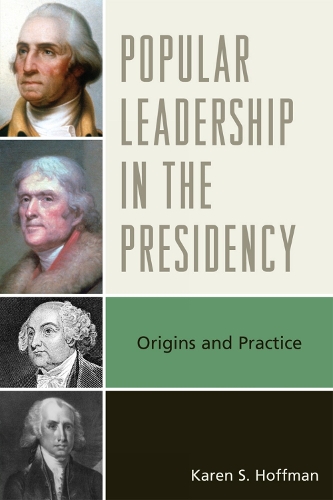
Popular Leadership in the Presidency: Origins and Practice
(Paperback)
Publishing Details
Popular Leadership in the Presidency: Origins and Practice
By (Author) Karen S. Hoffman
Bloomsbury Publishing PLC
Lexington Books
24th July 2010
United States
Classifications
Professional and Scholarly
Non Fiction
324.22
Physical Properties
Paperback
184
Width 154mm, Height 233mm, Spine 12mm
286g
Description
Most research on the president's relationship with the public focuses on modern presidents because they frequently give speeches in the attempt to build public support for their policy goals. Expanding the concept of presidential communication beyond policy speeches, Popular Leadership in the Presidency: Origins and Practice reveals the extent to which presidents have always communicated with the public. And it is not simply the existence of public communication that is significant, but the fact that structural elements of the presidency encourage a connection with the people. The fact that the executive consists of one individual, the symbolic authority that devolves on the president as the sole national leader, and a selection process that in practice turned out to be popular all encourages a relationship with the people. An examination of the first four presidents demonstrates the broad range of public persuasion practiced by early presidents as well as the way in which the structural encourages that behavior.
Reviews
Karen S. Hoffman's Popular Leadership in the Presidency is an important contribution to the literature on the rhetorical presidency. She offers a valuable perspective on the earliest history of presidential relations with the public. Her attention to detail is impressive, her writing is clear, and her analysis is insightful. This book will be welcomed by scholars in history, political science, and communication. -- Mary E. Stuckey, Georgia State University
Popular Leadership in the Presidency demonstrates that U.S. presidents and the public had forged a strong and enduring relationship long before the 24 hour news cycle and the internet. In this enlightening and engagingly written book, Karen S. Hoffman argues that this connection is encouraged by the very structure of the presidency: the Constitution's placement of executive power in a single person who would perform the symbolic role of sole national leader and be indirectly elected. Focusing on specific instances involving each of the first four presidents, Hoffman traces their rhetorical strategies as the chief executives sought to respond to public expectations while adapting to prevailing political norms and emerging traditions. Rooted in rich and varied historical evidence and propelled by informed scholarly argument, her analysis broadens the study of presidential rhetoric well beyond public speeches to encompass presidential use of the partisan press, action and inaction, and even attire. The result is a fascinating tale of the origins and initial evolution of the ongoing ties between presidents and the citizens they represent. -- Karen M. Hult, Virginia Polytechnic Institute & State University
Hoffman (visiting professor, Marquette Univ.) offers a thesis unique in presidential rhetoric scholarship. In the process, she challenges current arguments that assert there is a difference between the Founding generation and modern presidents in how they employed popular rhetoric. Hoffman argues simply that presidents have always used rhetoric to communicate to the citizenry. While the means and manner of that communication has changed over time, all presidents have used rhetoric in some fashion or form. It should be noted that Hoffman broadens the definition of rhetoric to include actions along with the spoken and written word. Furthermore, the author contends that the constitutional structure of the presidency not only allowed, but also encouraged, this development. The Constitution, then, encourages a "public presidency." To bolster her case that the president has always used rhetoric, Hoffman engages in a case study of the first four presidents. The point is not to fit them into a construct of "going public," but to account for how they "faced the public." Summing Up: Recommended. General readers, upper-division undergraduate students, graduate students, and research faculty. * Choice Reviews *
Author Bio
Karen S. Hoffman is visiting asssistant professor of political science at Marquette University.
